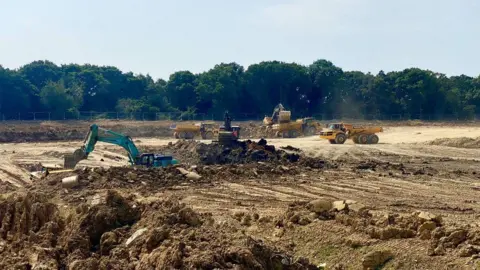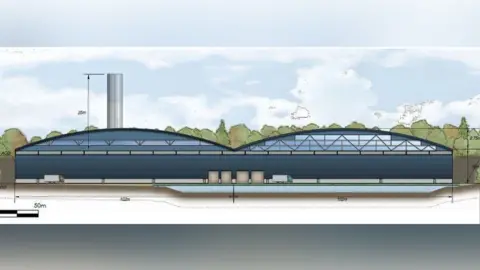Incinerator waste tax could cost more than landfill
 John Fairhall/BBC
John Fairhall/BBCA plan to send a county's waste to incinerators instead of landfill is being questioned, following a report that warned it could cost taxpayers more.
Essex County Council has committed to sending all its non-recyclable waste to incineration in a £1bn deal with waste company Indaver, which is building a new facility at a former airbase in Rivenhall, near Witham.
However, waste and bioenergy experts Tolvik Consulting warned new waste incineration fees proposed by the previous government would "exceed the cost of landfill".
A spokesperson for the council said it had put in place a waste reserve in the budget, which would mitigate against any future waste disposal costs.
The Emissions Trading Scheme (ETS) is a system that puts a market price on carbon emissions. It currently applies to the aviation industry, but the government proposed expanding it to include the incineration of waste in 2028.
Essex County Council said if the ETS was expanded to include energy from waste, it may involve £105m of cost pressure in the Medium Term Residual Waste (MTRW) treatment contract - about £26m per annum.
That could come into force in 2026 with potential financial implications from January 2028, the Local Democracy Reporting Service said.
A spokesperson for the Department for Energy Security and Net Zero, said: "Expanding the UK Emissions Trading Scheme to include energy from waste facilities will cut emissions and drive investment in cleaner supply chains.
"We continue to engage with industry and local authorities on the detail of this scheme, including how costs will be passed through to reflect emissions reductions and recycling efforts, and will provide further updates in due course."
 Gent Fairhead & Co
Gent Fairhead & CoEssex is one of a number of councils calling on the government to ensure the costs are passed on to the industries creating fossil-based materials - such as packaging - in the first place.
The council has been accused of relying too heavily on burning waste to avoid landfill taxes, which are currently £155 a tonne.
Green Party councillor James Abbott, who represents Rivenhall at Braintree District Council, said: "Essex County Council have said it's not going to do any more landfill and it's putting all of its residual waste at Rivenhall to burn. Full stop.
"And they're going to have to pay all of this tax - £100m over four years is a very large sum of money, which ultimately taxpayers are going to have to pay.
"Essex says it's going to get that money out of a reserve, but that reserve comes from taxpayers."
Mr Abbott said recycling in the county had "stalled at about 50% and it hasn't really moved, and that's the big problem".
"We should have been making more progress. There have been targets over the years and Essex County Council's own target was 60% but they never got there."
The council said it would "redouble its efforts" to encourage residents to recycle their plastic packaging and products.
A spokesperson said: "We have committed to ending the disposal of waste to landfill by 2030 due to its detrimental impact on the environment. The only other viable technology for waste disposal is EfW [energy from waste], as identified in the new Waste Strategy for Essex.
"We are just one of many local authorities facing the possible inclusion of EfW in the scheme [ETS], and we have done everything we can to manage the potential for this from a financial perspective, including the establishment of a waste reserve."
Follow Essex news on BBC Sounds, Facebook, Instagram and X.
